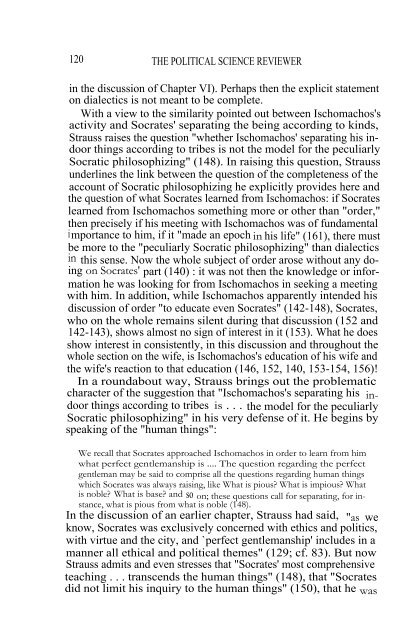Strauss on Xenophon's Socrates Xenophon's Socratic Discourse: An ...
Strauss on Xenophon's Socrates Xenophon's Socratic Discourse: An ...
Strauss on Xenophon's Socrates Xenophon's Socratic Discourse: An ...
You also want an ePaper? Increase the reach of your titles
YUMPU automatically turns print PDFs into web optimized ePapers that Google loves.
120 THE POLITICAL SCIENCE REVIEWER<br />
in the discussi<strong>on</strong> of Chapter VI). Perhaps then the explicit statement<br />
<strong>on</strong> dialectics is not meant to be complete.<br />
With a view to the similarity pointed out between Ischomachos's<br />
activity and <strong>Socrates</strong>' separating the being according to kinds,<br />
<str<strong>on</strong>g>Strauss</str<strong>on</strong>g> raises the questi<strong>on</strong> "whether Ischomachos' separating his indoor<br />
things according to tribes is not the model for the peculiarly<br />
<strong>Socratic</strong> philosophizing" (148). In raising this questi<strong>on</strong>, <str<strong>on</strong>g>Strauss</str<strong>on</strong>g><br />
underlines the link between the questi<strong>on</strong> of the completeness of the<br />
account of <strong>Socratic</strong> philosophizing he explicitly provides here and<br />
the questi<strong>on</strong> of what <strong>Socrates</strong> learned from Ischomachos: if <strong>Socrates</strong><br />
learned from Ischomachos something more or other than "order,"<br />
then precisely if his meeting with Ischomachos was of fundamental<br />
importance to him, if it "made an epoch in his life" (161), there must<br />
be more to the "peculiarly <strong>Socratic</strong> philosophizing" than dialectics<br />
in this sense. Now the whole subject of order arose without any doing<br />
<strong>on</strong> <strong>Socrates</strong>' part (140) : it was not then the knowledge or informati<strong>on</strong><br />
he was looking for from Ischomachos in seeking a meeting<br />
with him. In additi<strong>on</strong>, while Ischomachos apparently intended his<br />
discussi<strong>on</strong> of order "to educate even <strong>Socrates</strong>" (142-148), <strong>Socrates</strong>,<br />
who <strong>on</strong> the whole remains silent during that discussi<strong>on</strong> (152 and<br />
142-143), shows almost no sign of interest in it (153). What he does<br />
show interest in c<strong>on</strong>sistently, in this discussi<strong>on</strong> and throughout the<br />
whole secti<strong>on</strong> <strong>on</strong> the wife, is Ischomachos's educati<strong>on</strong> of his wife and<br />
the wife's reacti<strong>on</strong> to that educati<strong>on</strong> (146, 152, 140, 153-154, 156)!<br />
In a roundabout way, <str<strong>on</strong>g>Strauss</str<strong>on</strong>g> brings out the problematic<br />
character of the suggesti<strong>on</strong> that "Ischomachos's separating his indoor<br />
things according to tribes is . . . the model for the peculiarly<br />
<strong>Socratic</strong> philosophizing" in his very defense of it. He begins by<br />
speaking of the "human things":<br />
We recall that <strong>Socrates</strong> approached Ischomachos in order to learn from him<br />
what perfect gentlemanship is .... The questi<strong>on</strong> regarding the perfect<br />
gentleman may be said to comprise all the questi<strong>on</strong>s regarding human things<br />
which <strong>Socrates</strong> was always raising, like What is pious? What is impious? What<br />
is noble? What is base? and so <strong>on</strong>; these questi<strong>on</strong>s call for separating, for instance,<br />
what is pious from what is noble (148).<br />
In the discussi<strong>on</strong> of an earlier chapter, <str<strong>on</strong>g>Strauss</str<strong>on</strong>g> had said, "as we<br />
know, <strong>Socrates</strong> was exclusively c<strong>on</strong>cerned with ethics and politics,<br />
with virtue and the city, and `perfect gentlemanship' includes in a<br />
manner all ethical and political themes" (129; cf. 83). But now<br />
<str<strong>on</strong>g>Strauss</str<strong>on</strong>g> admits and even stresses that "<strong>Socrates</strong>' most comprehensive<br />
teaching . . . transcends the human things" (148), that "<strong>Socrates</strong><br />
did not limit his inquiry to the human things" (150), that he was

















